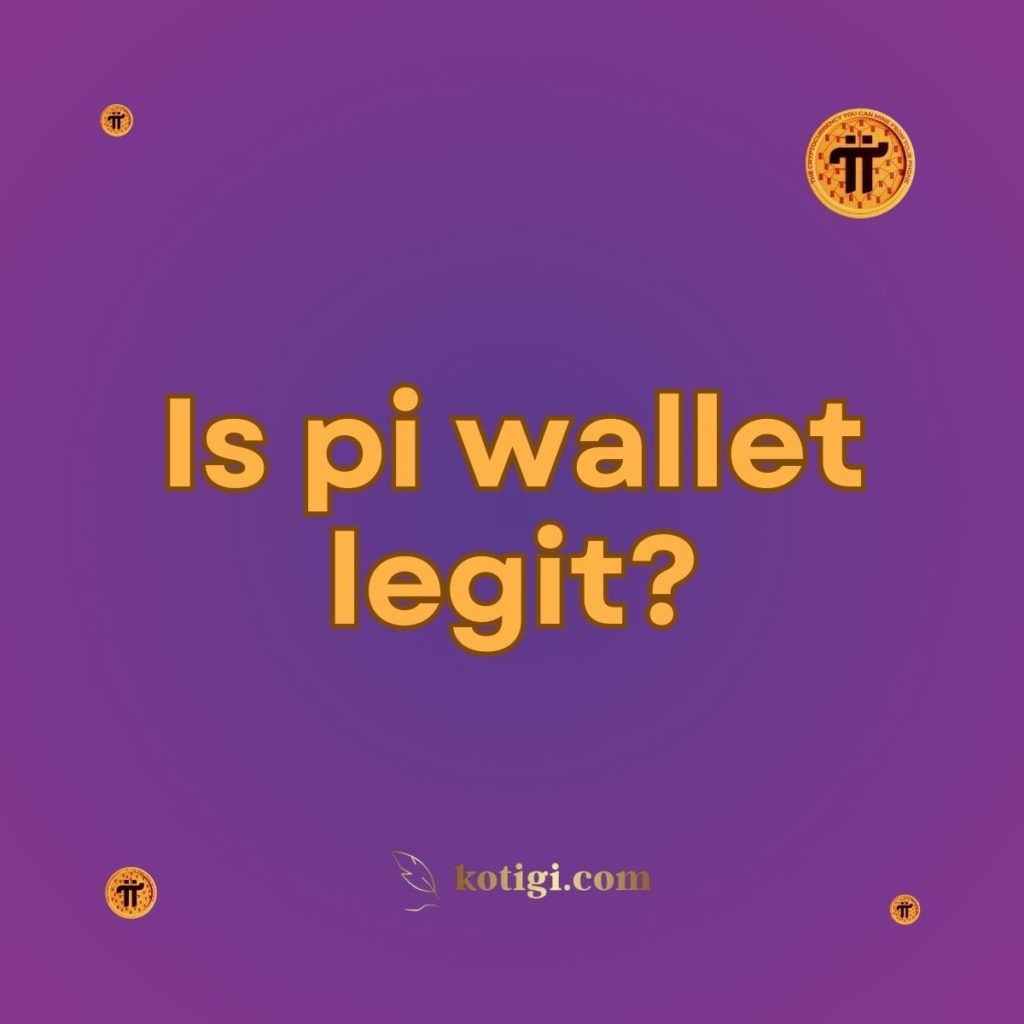
The Pi Network has generated significant buzz in the cryptocurrency community with its promise of democratizing access to digital currency through mobile mining. As the network evolves, one critical question that users often ask is: Is the Pi wallet legit? With millions of users mining Pi coins, understanding the legitimacy and security of the Pi wallet is crucial for safeguarding your assets and making informed decisions.
In this comprehensive guide, we’ll delve into the legitimacy of the Pi wallet, examining its features, security measures, and overall reliability. By the end of this post, you’ll have a clearer understanding of whether the Pi wallet is trustworthy and how to use it safely.
What is the Pi Wallet?
Before assessing its legitimacy, it’s important to understand what the Pi wallet is and how it functions:
Overview of the Pi Network
The Pi Network is a cryptocurrency project that allows users to mine Pi coins using their mobile devices. Unlike traditional cryptocurrencies that require specialized hardware, Pi can be mined through a simple mobile app, making it accessible to a broader audience.
Pi Wallet Basics
The Pi wallet is a digital wallet integrated into the Pi Network’s ecosystem. It is designed to store, send, and receive Pi coins. Currently, it is available through the Pi Browser app, which serves as a gateway to various Pi Network services, including the wallet.
How Does the Pi Wallet Work?
To determine if the Pi wallet is legitimate, it’s important to understand its functionalities and how it operates:
Wallet Setup
- Downloading the Pi Browser App: The Pi wallet is accessed through the Pi Browser app, which is available for both Android and iOS devices.
- Creating a Wallet: Users create a wallet by following the setup instructions in the app. A private key is generated, which is essential for accessing and managing the wallet.
Wallet Features
- Storing Pi Coins: The wallet allows users to store their Pi coins securely.
- Sending and Receiving: Users can send and receive Pi coins within the Pi Network ecosystem.
- Transactions: While real Pi coins cannot yet be transacted due to the testnet phase, the wallet supports transactions using Test Pi for practice.
Evaluating the Legitimacy of the Pi Wallet
To assess the legitimacy of the Pi wallet, we’ll examine several key aspects:
1. Developer and Team Background
The legitimacy of any digital wallet depends largely on the credibility of its developers and the team behind it:
- Pi Network Team: The Pi Network is developed by a team of Stanford graduates and experienced professionals in the fields of technology and business. The team’s credentials and transparency contribute to the project’s credibility.
- Public Information: Information about the team is publicly available on the Pi Network’s official website and other platforms, providing insights into their qualifications and experience.
2. Security Measures
Security is a critical factor in determining the legitimacy of a digital wallet. The Pi wallet employs several security measures:
- Private Key Management: The wallet generates a private key for each user, which is essential for accessing and managing their Pi coins. Users are advised to keep this key secure and confidential.
- Two-Factor Authentication (2FA): The Pi Browser app supports 2FA, adding an extra layer of security by requiring a second verification method.
- Data Encryption: The wallet uses encryption to protect user data and transaction information.
3. User Reviews and Feedback
User feedback and reviews can provide valuable insights into the legitimacy of the Pi wallet:
- Community Feedback: Reviews and experiences shared by users in online forums and social media can indicate the wallet’s reliability and functionality.
- Official Channels: The Pi Network’s official channels, including their website and social media accounts, offer updates and support, reflecting their commitment to transparency and user satisfaction.
4. Regulatory Compliance
Regulatory compliance is an important aspect of legitimacy for any financial tool:
- KYC Requirements: The Pi Network requires users to complete KYC (Know Your Customer) verification to enhance security and prevent fraud. This requirement reflects the network’s commitment to regulatory standards.
- Legal Considerations: The Pi Network operates within legal frameworks and follows best practices to ensure compliance with relevant regulations.
Common Concerns and Misconceptions
As with any emerging technology, several concerns and misconceptions may arise regarding the Pi wallet:
1. Scams and Fraud
- Phishing Scams: Users should be cautious of phishing scams that attempt to steal private keys or login credentials. Always verify the authenticity of communication and websites related to the Pi Network.
- Impersonation: Be wary of individuals or entities claiming to offer services or support related to the Pi wallet that are not officially affiliated with the Pi Network.
2. Real-World Value
- Testnet vs. Mainnet: Currently, Pi coins are in the testnet phase and do not have real-world value. Concerns about the wallet’s legitimacy should be differentiated from the value of Test Pi, which is used for practice and testing purposes.
- Future Prospects: The legitimacy of the wallet is based on its current features and security, while the future value and usability of Pi coins will depend on the network’s transition to the mainnet.
Steps to Ensure Safe Use of the Pi Wallet
To maximize the security and effectiveness of your Pi wallet:
1. Follow Security Best Practices
- Protect Your Private Key: Store your private key securely and never share it with anyone.
- Enable 2FA: Use two-factor authentication to enhance the security of your wallet.
2. Stay Informed
- Monitor Official Updates: Keep up-to-date with the latest news and updates from the Pi Network to stay informed about developments and changes.
- Be Cautious of Scams: Always verify the authenticity of any offers or communications related to the Pi wallet.
Conclusion
In conclusion, the Pi wallet is legitimate and operates with a focus on security and user management. Developed by a reputable team and equipped with essential security measures, the wallet provides a secure platform for managing Pi coins. While real Pi withdrawals are not yet possible due to the testnet phase, the wallet’s legitimacy is supported by its features, security practices, and compliance with regulatory standards.
As the Pi Network transitions to its mainnet phase, the wallet will play a crucial role in managing and utilizing Pi coins. By following best practices and staying informed, users can confidently use the Pi wallet and prepare for the future of the Pi Network.
Is pi wallet legit?
Pi wallet is legitimate and operates with a focus on security and user management. Developed by a reputable team and equipped with essential security measures, the wallet provides a secure platform for managing Pi coins.
Key Takeaways:
- The Pi wallet is legitimate, developed by a reputable team and designed for secure management of Pi coins.
- Security measures include private key management, two-factor authentication (2FA), and data encryption.
- User reviews and feedback can provide insights into the wallet’s reliability and functionality.
- Regulatory compliance is demonstrated through KYC requirements and adherence to legal standards.
- Be cautious of scams and phishing attempts related to the Pi wallet and always verify official communications.
- The current testnet phase does not allow real-world value or withdrawals, but the wallet is prepared for future use.
- Stay informed about updates and developments from the Pi Network to effectively manage your Pi assets.





